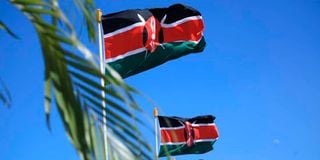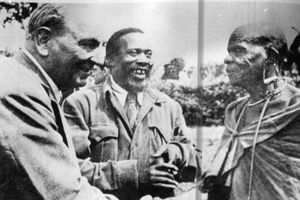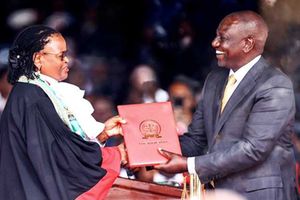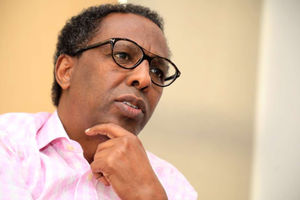
Kenya flags fly at Uhuru Gardens Park on December 11, 2021. Kenya has fallen from among the most dominant economies in Africa. It’s behind Nigeria, Egypt, South Africa, Algeria, Morocco, and Ethiopia.
In May 1981, the Moi-Kanu state forced me into exile to Tanzania after a severe crackdown on the senior student leadership, of which I was one, at the University of Nairobi. Our beef with the one–party state was its opacity and brazen dictatorship.
After walking though the border and dodging man-eating wild animals, I eventually arrived in Dar-es-Salaam. Dean Josephat Kanywanyi of the University of Dar-es-Salaam School of Law took me to Interior Minister Mohiddin Kimario to apply for political asylum.
I will never forget the minister’s expression upon hearing I sought to be a refugee in Tanzania. He wondered out loud how and why a Kenyan would seek to become a refugee, an extremely rare species in Tanzania.
Kenya was then viewed in the region and internationally as an oasis of calm in a sea of chaos. It was the envy of the continent. In fact, Kenya wasn’t viewed as an “African” country at all. Nairobi with its gleaming buildings and infrastructure stood out among African capitals – planned, clean, with organised traffic. It was said that for many Africans coming to Kenya was akin to visiting Europe.
Europeans and America adored Kenya as a pristine satellite state free of the usual Africa coups, expropriation of property, and other malignancies of the African post-colonial state. Of course we knew better as Kenyans. In Africa, we were viewed as a cut above the rest. We received refugees instead of producing them.
That changed with the Moi-Kanu state. In that period, and ever since, our compatriots have left the country in their hundreds of thousands. Many have fled political persecution and economic privation. Even so, Kenya still dominated the region like a colossus. It’s long been a regional hegemon. Until now.
Today, depending on the metrics, Kenya has fallen from among the most dominant economies in Africa. It’s behind Nigeria, Egypt, South Africa, Algeria, Morocco, and Ethiopia. In the region, our neighbours are quickly catching up with Ethiopia surpassing us, and Tanzania nipping at our heels. It’s a very good thing some of our neighbours are doing very well. Kudos to them. A prosperous neighbour is a great sibling.
A hungry neighbour is an angry neighbour, one who’s unstable and threatens your security with refugees and criminal cartels. We should applaud and be happy for our neighbours who are doing well, not pout and feel sorry for ourselves. We should wish Rwanda, Tanzania, Ethiopia, Uganda, and others even more prosperity. And we should extend a helping hand to those of our sister states who are in distress. If peace prevails, we shall trade more with each other, be less afraid of one another, and allow free movement of people across our borders. Our regional and political economic blocs in Africa – and the African Union in turn – will be a bulwark against an unjust international economic and political order.
But even as we celebrate our neighbours who are doing well, we need to ask what happened to us. Why are we falling behind? How can we be the best version of ourselves? Can we be an anchor state in Africa? Can we join the league of South Africa, Egypt, and Nigeria? We know this much – we were for long a preferred destination for tourism in Africa.
In the world in fact. Our wildlife and physical beauty have no equal. But our tourism sector has either stunted, or declined. Our infrastructure, even in our top tourist destinations, is a mangle of a jungle – overcrowded, pot-holed, and littered with abominations like unruly and primitive boda boda and tuk tuks.
Pray, tell me, what foreigner with good cash in their pocket wants to spend it in a nightmare of boda boda and tuk tuks when they can go to South Africa, Egypt, or Vietnam? We used to be the darling of foreign investors. But no more. The only “foreign” investors who still love Kenya are its diasporic sons and daughters. And that’s because it’s difficult to divorce your parents, even if they are cruel to you. Others have fled because of corruption, the cost of power for fueling business, our terrible infrastructure, and now increasing illiteracy by our youth. We were known for a stellar educational system which produced an unbeatable professional well-educated working force. That’s now nunca mas.
The genocidal violence after the 2007 elections forever changed how Kenya was viewed externally. Some Africans who had long loathed our success, celebrated that Kenya had now become an “African” country. We have recovered from that lowest of our moments. We have arguably the freest press in Africa. Our democracy is vibrant, even if our electoral system fails more often than not.
In Kenya, you can insult anyone and still live. Our middle and professional classes are in distress, but are still among the best in Africa. We must recapture our ethics, make it easier to business, and eradicate corruption to become an anchor state.
- Makau Mutua is SUNY Distinguished Professor and Margaret W. Wong Professor at Buffalo Law School, The State University of New York. @makaumutua.













